Theory of Human Caring on APN Role
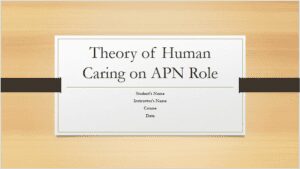
Hello and welcome to this PowerPoint presentation on the theory of human caring in the APN role. This presentation will outline my future APN role and previous experience with this theory. It will also analyze this theory and outline its core concepts and the Caritas process defined in this theory. The presentation will be finalized by highlighting the implications of this theory to APNs.
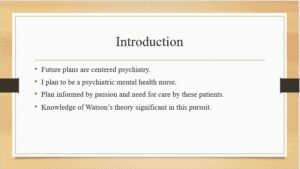
My plans for the APN role are centered around psychiatry. I plan to pursue psychiatric mental health nursing upon completing my FNP. The basis of this selection is the high needs of patients in this nursing cadre, which has long been given relatively less attention than other illnesses. Additionally, my choice of this field has been informed by my passion for caring for these patients, having witnessed those around me suffer silently because of these illnesses. By being the difference in these clinics, I believe I can make a difference to these patients by caring in a manner that respects and affirms their humanity. Knowledge of the Watson theory of caring will enhance my care management expertise and enable me to carry out my duties in a manner that exhibits respect for my patients and optimizes their clinical outcomes.
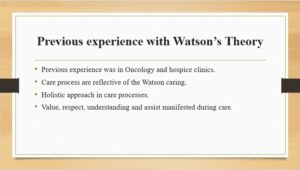
Having worked at an oncology clinic and in a hospice center, I have experienced and appreciated patient caring, as drawn by Watson’s theory. These care facilities are mainly targeted at cancer patients. It is critically important to understand that these patients are incarcerated only on their health condition and that these incarcerations don’t make them lesser human beings. For this, their care providers handle them in a manner that promotes their health. Utilization of a holistic approach that targets their physical body healing and their spirits and minds. This is evident in the various treatment modalities utilized, such as psychosocial therapy and other mind-body techniques. This holistic approach aims to ensure that the patients feel valued, respected, understood, and assisted, as drawn by Watson’s theory.
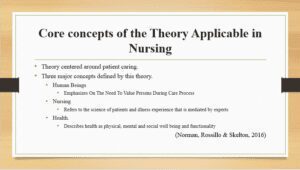
Watson’s theory of caring details a patient caring process that promotes the health of the patients as well as ensures a care environment that accepts the patients for who they are. This theory emphasizes the need to understand that patients are human beings and only present at the clinic because of their health-attributed incarcerations (Norman, Rossillo & Skelton, 2016). The theory postulates that the central concepts in nursing include the nursing process itself, health, and human beings or the person. The idea of human beings emphasizes the need to value persons during the care process and respect, nurture, understand, and assist in whichever way possible. Human beings are believed to be at the core of healthcare provision. They, therefore, deserve to be viewed not by their incarcerations and parts but as humans. On health, the theory describes health as physical, mental, and social well-being and functionality. Also, health entails adaptability to daily functionalization, freedom from disease, and the ability to exhibit efforts to prevent illness. As drawn by this theory, the nursing concept refers to the science of patients and infection experiences that persons with the necessary expertise and scientific knowledge mediate.
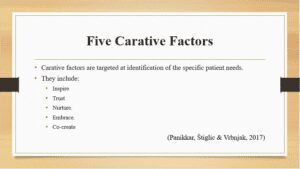
As postulated by Watson’s theory, curative factors are targeted at identifying specific patient needs. The approach addresses how these needs could be addressed in the overall attainment and maintenance of care that ensures better clinical outcomes.
These factors include trust, inspiration, nurturing, embracing, and co-creating. Trust entails trusting self and others by encouraging and promoting the beliefs of every individual and their growth and practices. Inspiration entails having faith, hope, and honor for the people around you. Embrace as we well entails the manifestation of altruistic values and practicing kindness and love with yourself and others around you. Nurturing entails developing relationships characterized by trust, care, and the ability to help. Co-creation entails the developing or promoting an environment that res
